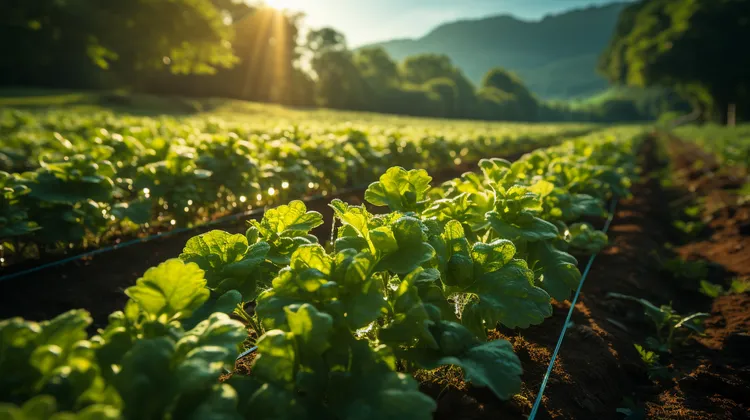The role of blockchain technology in agriculture has gained significant attention in recent years, offering promising solutions to address the challenges faced by the sector while advancing the United Nations’ Sustainable Development Goals (SDGs). Blockchain, originally developed as the underlying technology for cryptocurrencies like Bitcoin, is a decentralized ledger system that allows secure and transparent recording of transactions. This technology has the potential to revolutionize the agricultural industry by promoting transparency, traceability, efficiency, and trust throughout the supply chain.
One of the critical challenges faced by the agricultural sector is the lack of transparency in the supply chain. Blockchain can address this issue by providing a tamper-proof and immutable record of every transaction involved in the production and distribution of agricultural products. This enables consumers to have access to reliable information regarding the origin, quality, and sustainability of the products they consume. By promoting transparency, blockchain empowers consumers to make informed choices that align with their values, such as supporting local and organic farming or avoiding products associated with child labor or deforestation.
Blockchain technology can enhance the traceability of agricultural products, which is crucial for food safety and security. With blockchain, each product can be assigned a unique identifier that records every stage of its journey, from the farm to the fork. This allows for swift identification and containment of any issues or outbreaks, reducing the risk of foodborne illnesses. The traceability provided by blockchain can help eliminate fraud and counterfeiting, ensuring that consumers are receiving genuine and high-quality agricultural products.
In addition to promoting transparency and traceability, blockchain technology has the potential to enhance the efficiency of agricultural processes. By digitizing and automating manual record-keeping tasks, blockchain can streamline administrative processes, reduce paperwork, and eliminate unnecessary intermediaries. This not only saves time and resources but also improves the overall productivity and profitability of farmers. The increased efficiency brought about by blockchain technology can help small-scale farmers in developing countries access markets, obtain fair prices for their products, and improve their livelihoods.
Blockchain technology can play a pivotal role in advancing several of the United Nations’ Sustainable Development Goals. For instance, SDG 2 aims to end hunger, achieve food security, improve nutrition, and promote sustainable agriculture. Through its transparent and traceable nature, blockchain can ensure that agricultural practices comply with sustainable standards, such as fair trade, organic farming, and responsible water usage. This can contribute to the achievement of SDG 2 by promoting sustainable agricultural practices that conserve natural resources and minimize the negative impact on the environment.
Blockchain can significantly contribute to SDG 5, which focuses on gender equality and empowering women. By providing transparent and immutable records, blockchain can help eliminate gender-based discrimination in agricultural value chains, ensuring fair access to resources, information, and financial services for women. Blockchain-based smart contracts can facilitate secure and transparent transactions, enabling women farmers to access markets, negotiate fair prices for their goods, and reduce the gender income gap in the agricultural sector.
Blockchain technology can support SDG 12, which aims to ensure responsible consumption and production patterns. By providing consumers with transparent information about the sustainability and ethical standards related to agricultural products, blockchain can empower individuals to make conscious choices that support responsible production and reduce waste. This promotes sustainable consumption and production patterns by encouraging the adoption of environmentally friendly and socially responsible agricultural practices.
Blockchain technology holds immense potential to transform the agricultural sector and contribute to the achievement of the United Nations’ Sustainable Development Goals. By promoting transparency, traceability, efficiency, and trust in the supply chain, blockchain can enhance food safety, empower consumers, support small-scale farmers, conserve natural resources, promote gender equality, and encourage responsible consumption and production. To fully leverage the benefits of blockchain in agriculture, it is necessary to address challenges such as the high cost of implementation, interoperability between different systems, and the lack of digital and financial literacy in certain regions. The role of blockchain in agriculture is poised to play a significant role in shaping a more sustainable and inclusive future for the sector.




Blockchain’s potential to streamline administrative processes in agriculture is so exciting! 💼 By reducing paperwork and digitizing records, we can save time and resources, ultimately benefiting farmers and enhancing their productivity. 🌟💪
The idea that blockchain can empower women in agriculture is incredible! By eliminating gender-based discrimination and providing access to resources, information, and financial services, we can achieve SDG 5 and promote gender equality.
Blockchain won’t address the unequal access to resources and opportunities in the agricultural sector. It only benefits those who can afford it. 🚫
This is just another hyped-up technology that will never live up to its promises.
I’m blown away by the potential of blockchain to support SDG 2 and ensure sustainable agriculture. 🌾 By promoting fair trade, organic farming, and responsible water usage, we can contribute to a better future for both people and the planet. 🌱🌍✨